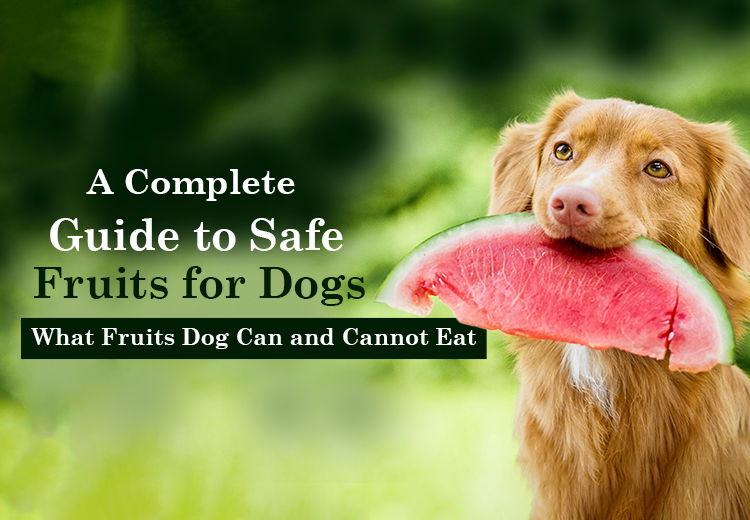 Feb 15, 2023
Feb 15, 2023

As a pet owner, you may often find your furry friend gazing at you with starry eyes as you enjoy fruits. It's natural to wonder if you can share some of your fruits with your dog or not. This guide can help you understand which fruits are safe to feed to your dog, as well as the benefits they can provide.
It's true that fruits are packed with vitamins and minerals, but it's important to keep in mind that dogs have different nutritional needs than humans. While fruits are not essential for a dog's diet, they can still provide an extra boost of vitamins and minerals that can benefit your dog's overall health.
There are several fruits that is beneficial for dog health. The only concern is that these fruits must be fed occasionally in moderation like a treat. Following below is the list of fruits that are safe and healthy for dogs.
Apples: Apples are high in fibre and vitamin C, and they can help keep a dog's teeth clean.
Blueberries: Blueberries are high in antioxidants, which can help boost dog's immune system.
Watermelon: Watermelon has 92% of water in it which makes it a good source of hydration and contains vitamins A, B6 and C, lycopene and amino acids. It's important to remove the rid and seed of the fruit before giving it to the dog.
Cantaloupe: Cantaloupe is a good source of vitamins A and C, and it can help support a healthy immune system.
Bananas: Bananas are a good source of potassium, vitamins B6 and C, and dietary fibre.
Strawberries: Strawberries are a good source of vitamin C, folate, and potassium.
Mangoes: It is enriched with nutrients like carotenoids, fibre, and potassium. It also contains several vitamins like A, B6, C, and E.
Papaya: Papaya is a rich source of enzymes, specifically papain, which can aid in digestion and reduce inflammation in dogs. It also contains Vitamins C, E, and A and other antioxidants which can support good overall health.
Foods which are toxic to dog's health or bad for their digestion are as follows:
Grapes and Raisins: Grapes and raisins can cause kidney failure in dogs, even in small amounts.
Avocados: Avocados contain persin, which can cause vomiting and diarrhea in dogs.
Cherries: The pits, leaves and stems of cherries contain cyanide which can be toxic if ingested by dogs.
Persimmons, Peaches and Plums: These fruits contain a toxin called cyanogenic glycosides, which can cause vomiting and diarrhea in dogs.
Pineapple: The stem, leaves, and skin of pineapple contain bromelain which can cause irritation to the mouth, tongue and lips.
Pears: Pears should not be given to dogs because they can cause stomach upset and diarrhea.
While fruits can be a healthy treat for dogs, it's important to remember that they should be fed in moderation. To ensure your dog's safety and well-being, it's essential to take the proper precautions when feeding them fruits. Some of the tips to keep in mind include:
Bottom line:
There are several benefits of introducing fruits into a dog's diet such as a strong immune system, healthier coat and skin, and stronger teeth and nails. You just need to make sure that you choose the right fruits that are good for them and avoid toxic fruits by any means. Moreover, make sure to administer food in the right proportion mostly as a treat and not as a regular diet as it can upset their stomach or cause sensitivity.